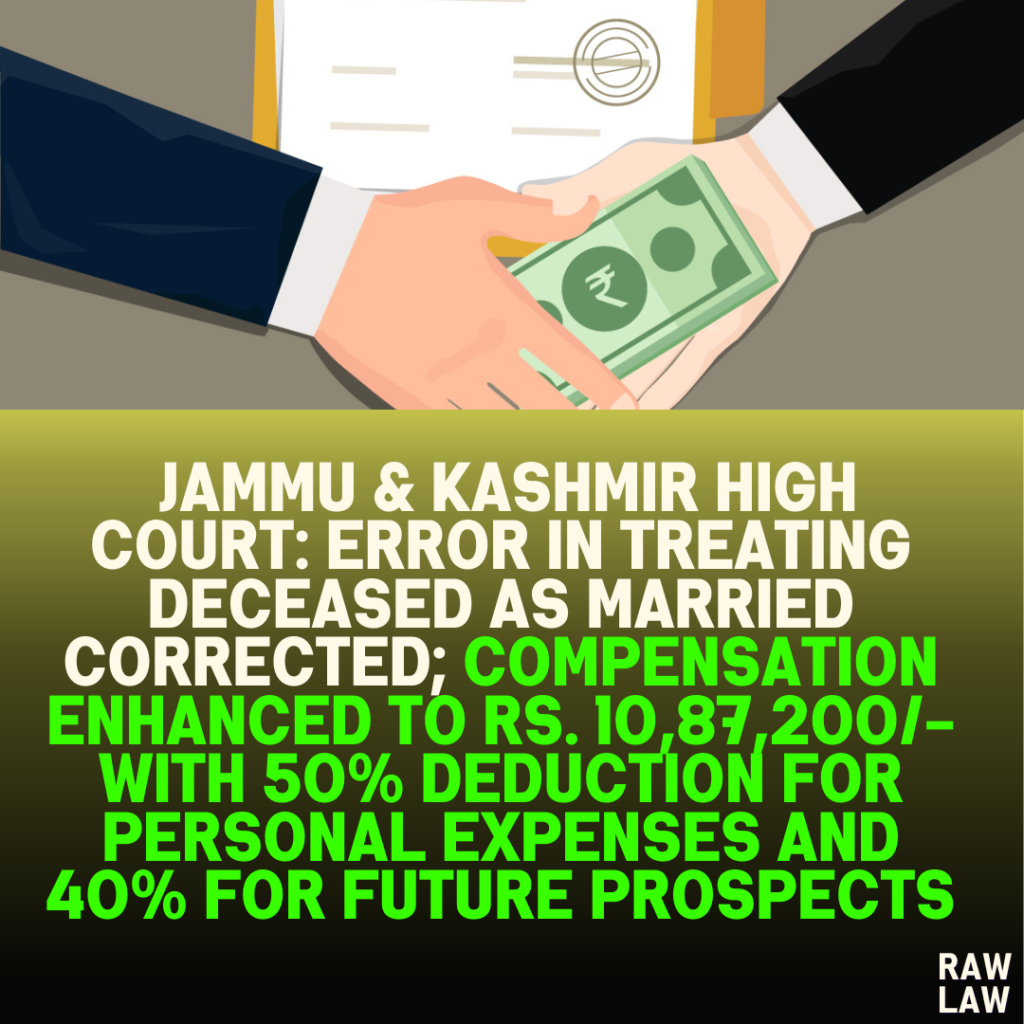Court’s Decision
The High Court of Jammu and Kashmir reviewed the judgment dated 12.03.2024 in response to the petition filed by the review petitioners under Section 65 of the J&K High Court Rules, 1999 read with Order 47 Rule 1 of the Code of Civil Procedure, 1908. The court held that there was an error apparent on the face of the record as the deceased was erroneously considered married, leading to an incorrect deduction of 1/3rd of his income for personal expenses instead of 50% as applicable to a bachelor. Accordingly, the compensation was recalculated and enhanced from Rs. 10,35,360/- to Rs. 10,87,200/-. The review petition was allowed, and the respondents were directed to pay the balance amount within three weeks.
Facts
The review petitioners sought review of the judgment passed by the High Court on 12.03.2024, in which compensation was calculated based on the erroneous assumption that the deceased was married, resulting in an incorrect deduction of his income for personal expenses. The deceased was, in fact, a bachelor, and 50% of his income should have been deducted for personal expenses instead of 1/3rd. Moreover, the enhancement under the head of “future prospects,” which the claimants were entitled to, had not been applied in the initial judgment.
Issues
- Whether the deceased should be considered a bachelor for the purpose of calculating deductions for personal expenses?
- Whether the review petitioners are entitled to a recalculation of compensation based on the future prospects as per the Apex Court’s guidelines?
Petitioner’s Arguments
The review petitioners argued that there was a clear error on the face of the record, as the deceased was a bachelor, and the deduction for personal expenses should have been 50% instead of 1/3rd. Further, the court did not consider the enhancement for future prospects to the extent of 40% as laid down by the Supreme Court in “Magma General Insurance Co. Ltd. vs Nanu Ram alias Chuhru Ram & Ors.” and “National Insurance Co. Ltd. vs Pranay Sethi”.
Respondent’s Arguments
The respondents conceded that the deceased was a bachelor, and there was an error in calculating the deduction for personal expenses. They accepted that the deduction should have been 50% as the deceased was unmarried at the time of his death.
Analysis of the Law
The court referred to the established legal principles laid down by the Supreme Court in the judgments of “Magma General Insurance Co. Ltd. vs Nanu Ram alias Chuhru Ram & Ors.” and “National Insurance Co. Ltd. vs Pranay Sethi”, which dictate that for a bachelor, 50% of his income should be deducted as personal expenses, and an addition of 40% should be made towards future prospects.
Precedent Analysis
- “Magma General Insurance Co. Ltd. vs Nanu Ram alias Chuhru Ram & Ors.” – The Supreme Court observed that for calculating compensation for future prospects, 40% of the established income should be considered.
- “National Insurance Co. Ltd. vs Pranay Sethi” – The Supreme Court held that in case of a bachelor, 50% of the income should be deducted for personal expenses.
Court’s Reasoning
The court reasoned that the failure to deduct 50% for personal expenses and to add 40% for future prospects was a mistake apparent on the face of the record. As the deceased was a bachelor, the correct approach would be to deduct 50% of his income and add 40% for future prospects as per the aforementioned Supreme Court judgments.
Conclusion
The judgment dated 12.03.2024 was reviewed, and the compensation was recalculated, enhancing the amount payable to the petitioners. The final compensation awarded to the petitioners was Rs. 10,87,200/- instead of Rs. 10,35,360/-. The respondent was ordered to pay the balance amount within three weeks.
Implications
This judgment reaffirms the principle that the deduction for personal expenses should be based on the marital status of the deceased and highlights the importance of applying the Supreme Court’s guidelines in calculating future prospects to ensure accurate and just compensation.



